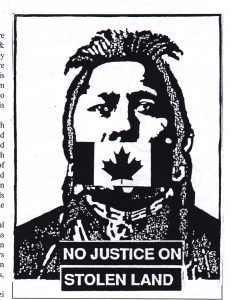Hi all!
I have chosen pages 15-16 of Thomas King’s Green Grass Running Water. I chose these pages because a range of characters are introduced whose names alone sparked intrigue in me. In particular, it was Dr. Joseph Hovaugh that I felt the most interested in, so it is he who I have researched.

No Justice On Stolen Land
The pages themselves are overall set in the realist story, placing characters with names that sounded vaguely familiar to me in a realistic setting. This thread of the interwoven storytelling was my favourite from the novel.
Guided by Jane Flick’s references, I was able to gain further insights for Joseph present in my chosen pages. Flick says it is likely that the asylum Hovaugh runs is St. Augustine which is the site of Fort Marian.
On page 15 we are introduced to Dr. Joseph Hovaugh, whose name is derived from the biblical name Jehovah which refers to God himself. God says “I am Jehovah. That is my name” (Isaiah 42:8) It is his personal name, what he refers to himself as. In these pages of GGRW, Hovaugh is delighted by nature serving him in the form of his massive desk. It was not the item of the desk itself that struck me as odd, but rather his reaction as it “reminded him of a tree cut down to the stump” (15). He was “delighted” (15) at the sight of it, which for some reason sickened me. Perhaps it is the context of his character and the book itself that soured this introduction as he is who runs the asylum. Through some research I came across an extremely insightful doctorate thesis paper by Madelaine Christine Jacobs titled “Assimilation Through Incarceration: The Geographic Imposition Of Canadian Law Over Indigenous Peoples.” In her thesis, Jacobs explains how “Imprisonment is more than a by-product of socio-economic inequality stemming from colonialism. Justice may take many forms. However, state justice is fundamentally embedded in the politics of territorial control. The very existence of indigenous peoples unsettled colonial ideological claims to the lands that became Canada.” (Jacobs, 2) I connected this to the pages introducing Hovaugh, because of one subtle line of text: “Dr. Hovaugh turned away from the window. Perhaps he should move the desk out and get another that didn’t seem so rooted and permanent.” (16) This line occurs directly after Mary alerts Hovaugh to the presence of The Police (Indians) outside the asylum… again. His response to this information signals to me that he feels threatened, as he tries to engage Mary in conversation about the season, the garden, and his contemplation about getting a pair of peacocks. This could be perceived as inflated self-confidence at first, but is quickly subverted by Hovaugh “[shrinking] behind his desk as though it were growing” (16) which indicates that nature, and the connections that The Police (Indians) have to it are creeping up on Hovaugh. Their very existence threatens him, even in the form of a large wooden desk in his office. It is then that he turns his back on the natural world outside his window and seriously considers replacing the wooden desk with one that feels less “rooted and permanent” (16). I read this as he himself not being as delighted with it as he was upon its arrival, as it now is a stark reminder of what he is not: rooted and permanent. The land he consumes and the people he imprisons have more claim to the land and its resources than he does. Again, this threatens him and his fragile territorial control. So, there it is. My reading into how Hovaugh’s quick rejection of an object that brought him joy being tied back to the fragility of his unsettled colonial ideological claims (as described by Jacobs in her thesis).
Works Cited:
Flick, Jane. “Reading Notes for Thomas King’s Green Grass, Running Water.” Canadian Literature, 1999, https://blogs.ubc.ca/engl372-99c-2019wc/files/2013/11/GGRW-reading-notes1.pdf.
Jacobs, Madelaine Christine. “Assimilation Through Incarceration: The Geographic Imposition Of Canadian Law Over Indigenous Peoples.” Www.collectionscanada.gc.ca, Sept. 2012, www.collectionscanada.gc.ca/obj/thesescanada/vol2/OKQ/TC-OKQ-7557.pdf.
King, Thomas. “Green Grass Running Water” HarperColins Publishers, 1993.